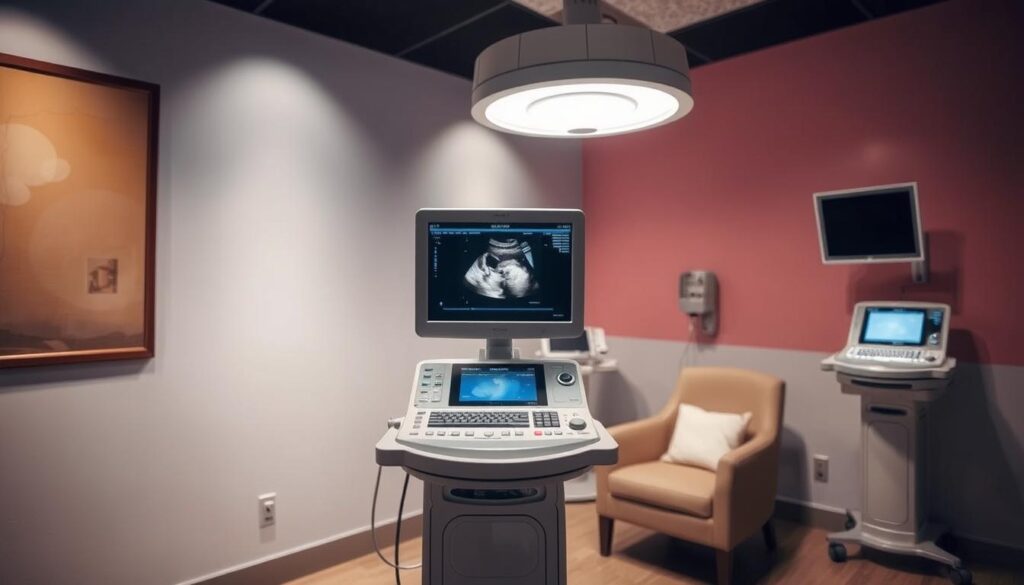Prenatal imaging offers an exciting glimpse into your unborn baby’s world. Obstetric sonography provides insights into your baby’s development. This safe procedure tracks your baby’s growth and health1.
Your baby scan typically lasts around 45 minutes. It may extend to 75 minutes if a consultation is included1. You might need to keep a full bladder for better visualization.
Ultrasound technology is safe for both mother and baby. Medical experts use it to detect potential developmental issues. Trained sonographers will guide you through the process1.
Key Takeaways
- Prenatal imaging provides a detailed look at your baby’s development
- Ultrasound appointments typically last 45-75 minutes
- The procedure is completely safe for both mother and baby
- Preparation may include specific instructions from your healthcare provider
- Sonographers are highly trained professionals in unborn baby monitoring
Understanding Fetal Ultrasound and Its Purpose
Pregnancy ultrasounds are amazing tools for tracking fetal growth. They offer a unique view into the womb, showing the baby’s development. Doctors use this non-invasive method to monitor the baby’s health2.
What is Prenatal Imaging?
Prenatal imaging creates detailed pictures of your growing baby using sound waves. A device called a transducer is placed on your belly. It turns sound waves into images on a screen3.
These images reveal important info about your baby’s growth. They can also show potential health issues that may need attention.
Benefits of Ultrasound During Pregnancy
- Checking for potential fetal defects2
- Determining precise gestational age4
- Evaluating placenta placement
- Monitoring baby’s growth and movement
Types of Fetal Ultrasound Technology
| Ultrasound Type | Purpose | Timing |
|---|---|---|
| 2D Ultrasound | Basic fetal measurements | Throughout pregnancy |
| 3D Ultrasound | Detailed facial and organ visualization3 | Mid to late pregnancy |
| Doppler Ultrasound | Blood flow assessment4 | Later stages of pregnancy |
Remember, ultrasounds are considered safe when performed by trained medical professionals for legitimate medical reasons4. Talk to your doctor about which ultrasound type fits your pregnancy needs best.
“Seeing your baby for the first time is a moment of pure wonder and connection.” – Pregnancy Wellness Magazine
Preparing for Your Prenatal Ultrasound Appointment
Prepping for your womb imaging doesn’t have to be stressful. A few simple steps can make your screening smooth and comfy5.
Easy prep ensures a great experience. Follow these tips for a successful ultrasound visit.
- Wear comfortable, loose-fitting clothing that allows easy access to your abdomen5
- Arrive 10 minutes early for your scheduled appointment5
- Bring any necessary medical documentation
- Consider bringing a supportive companion
Prep varies based on the ultrasound type. Your healthcare provider might suggest:
- Drinking water to ensure a full bladder for better image quality6
- Scheduling during early pregnancy stages for comprehensive gestational screening6
- Bringing first trimester screening blood test results5
“Preparation is key to a successful and informative prenatal ultrasound experience.”
Pro tip: Ask your provider about specific requirements. Each practice might have different protocols for prenatal imaging5.
The Complete Ultrasound Examination Process
Fetal ultrasound is crucial for monitoring unborn babies. It offers parents a safe view of their developing child. Modern ultrasound technology shows your baby’s growth in detail.
Preparing for Your Imaging Experience
A healthcare pro will guide you through your fetal ultrasound. The exam involves several key steps.
- Comfortable positioning on an exam table
- Application of special conducting gel
- Use of specialized imaging equipment
The Scanning Procedure Explained
A trained sonographer will move a transducer across your abdomen. This device sends sound waves to create real-time images of your baby7.
The procedure is painless and usually takes about 30 minutes7. You’ll see your baby’s movements on a screen.
What Healthcare Providers Evaluate
During the fetal ultrasound, your provider will look for specific growth markers8. These include size, organ development, and overall health.
| Assessment Area | Details Checked |
|---|---|
| Fetal Size | Measuring head, body, and limb proportions |
| Organ Development | Checking critical organ formation |
| Placental Health | Evaluating placenta location and condition |
| Amniotic Fluid | Assessing fluid levels and quality |
Doppler ultrasound might check blood flow in the umbilical cord7. This gives extra info about your baby’s health.
Remember, each ultrasound is a unique glimpse into your baby’s development, offering reassurance and important medical information.
Conclusion
Pregnancy ultrasound offers a peek into your baby’s world. It provides crucial medical insights and connects you with your unborn child. Fetal ultrasound monitors growth and detects potential health issues early9.
Your doctor will perform each ultrasound with care and skill. Routine scans improve detection of abnormalities and multiple pregnancies9. The American Institute of Ultrasound in Medicine stresses responsible use and proper training10.
Advanced imaging is exciting, but ultrasounds should only be done when needed. Extended exposure may carry risks. Your medical team will balance diagnostic needs with safety10.
Each ultrasound is unique. Stay informed and work closely with your doctor. You’ll face this exciting time with confidence and ease.
FAQ
What is a fetal ultrasound?
Are ultrasounds safe for my baby?
How many ultrasounds will I have during my pregnancy?
What types of ultrasound technologies are used?
How should I prepare for my ultrasound?
Does an ultrasound hurt?
When can I first see my baby on an ultrasound?
Can ultrasounds determine my baby’s gender?
What will the sonographer look for during the ultrasound?
How long does a typical ultrasound take?
Source Links
- 20 Week Ultrasound (Anatomy Scan): What to Expect – https://my.clevelandclinic.org/health/diagnostics/22644-20-week-ultrasound
- Fetal Ultrasound – https://www.hopkinsmedicine.org/health/treatment-tests-and-therapies/fetal-ultrasound
- Fetal ultrasound – https://www.mayoclinic.org/healthy-lifestyle/pregnancy-week-by-week/in-depth/fetal-ultrasound/art-20546827
- Ultrasound In Pregnancy: What To Expect, Purpose & Results – https://my.clevelandclinic.org/health/diagnostics/9704-ultrasound-in-pregnancy
- How to Prepare for Your Ultrasound Appointment – POGU – https://pogu.com.au/how-to-prepare-for-your-ultrasound-appointment/
- Prenatal care: First trimester visits – https://www.mayoclinic.org/healthy-lifestyle/pregnancy-week-by-week/in-depth/prenatal-care/art-20044882
- Obstetric Ultrasound – https://www.radiologyinfo.org/en/info/obstetricus
- Ultrasound: MedlinePlus Medical Test – https://medlineplus.gov/lab-tests/sonogram/
- Ultrasound for fetal assessment in early pregnancy – https://pmc.ncbi.nlm.nih.gov/articles/PMC6464767/
- Prudent Use and Safety of Diagnostic Ultrasound in Pregnancy – https://www.aium.org/resources/official-statements/view/prudent-use-and-safety-of-diagnostic-ultrasound-in-pregnancy
